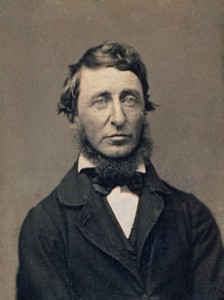Walden Pond, an icon of the environmental movement, was the retreat and experiment in simple living of Henry David Thoreau (1817-1862), but it is often used for self-promotion by those who neither understand, nor care about our planet. Thoreau believed man’s stewardship of the environment was necessary to the enrichment of his spirit, not his bank account; and, since he spent $28.11 to build his simple cabin by Walden Pond, his was a very different kind of economy.
Thoreau advocated that by living simply and keeping possessions to a minimum, a man could better enjoy the essence of life. He wrote, “Excessive devotion to business and money coarsens the fabric of society.” For anyone to take one cell from his body of thought and commercialize it into a mutation of its true meaning is an insult to Thoreau and those who follow his tenets.
 Thoreau was a Harvard graduate from a working class family. His father was a pencil maker, and his mother ran a boardinghouse. Thoreau himself was a gardener and handyman for Transcendentalist Ralph Waldo Emerson, who became his benefactor, and who owned the land where Thoreau built his retreat. Thoreau lived at Walden Pond from July 4, 1845 until September 6, 1847, observing nature, reading, writing and visiting with friends.
Thoreau was a Harvard graduate from a working class family. His father was a pencil maker, and his mother ran a boardinghouse. Thoreau himself was a gardener and handyman for Transcendentalist Ralph Waldo Emerson, who became his benefactor, and who owned the land where Thoreau built his retreat. Thoreau lived at Walden Pond from July 4, 1845 until September 6, 1847, observing nature, reading, writing and visiting with friends.
Naturalist Thoreau is also known for his Libertarian principles. What many consider his most important work, his essay “Civil Disobedience” reflects Thoreau’s philosophy regarding the rights of the individual. He wrote it after being jailed for refusing to pay a poll tax in protest against slavery and the Mexican War. Thoreau felt the American people should refuse to obey any law they believed to be unjust. His views on passive resistance inspired reformers who followed, including Mahatma Gandhi and Dr. Martin Luther King.
Thoreau wrote: “The authority of government…. Is still an impure one: to be strictly just, it must have the sanction and consent of the governed. It can have no pure right over my person and property but what I concede to it…. There will never be a really free and enlightened State until the State comes to recognize the individual as a higher and independent power, from which all its own power and authority are derived, and treats him accordingly.”
On politicians, Thoreau wrote, “No man with a genius for legislation has appeared in America. They are rare in the history of the world. There are orators, politicians, and eloquent men, by the thousand; but the speaker has not yet opened his mouth to speak who is capable of settling the much?vexed questions of the day.”
I’m certain that Thoreau would agree that on the environmental front, our politicians, by failing to say “no” to the damaging interests lining their pockets, have not addressed “the much-vexed issues of the day,” nor have they recognized the right of the citizen to a clean, contaminant-free environment. Failure to pass laws that protect us is equally as evil as passing those that do.
We now know that there are 700 measurable chemicals in our bodies that were not in anyone’s body in Thoreau’s time. Studies link many of them to birth defects, lowered sperm count, cancer and a multitude of illnesses, all of which we host in the name of higher profits. We are bombarded with environmental and consumption pollution about which the long-term effects are barely known.
Emerson wrote: “The problem of restoring to the world original and eternal beauty, is solved by the redemption of the soul…. The reason why the world lacks unity, and lies broken and in heaps, is, because man is disunited with himself. He cannot be a naturalist, until he satisfies all the demands of the spirit.”
And you can’t put a price on the soul and the spirit.










